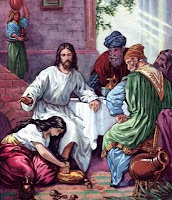The Messiah’s Secret – Bethany
Evening Lectionary: Exodus 6: 2-13. John 12: 1-8
Someone wrote – “Criticism, like rain, should be gentle enough to nourish one’s growth without destroying one’s roots.”
In our reading in Exodus Moses was being criticised unfairly as he sought to be obedient to God’s will by the people of Israel for being unsuccessful when he went with God’s message to Pharaoh, “Thus says the Lord, the God of Israel, ‘Let my people go, that they may hold a feast to me in the wilderness.’” Pharaoh refused to let the people go, instead he made the people work harder by having to go and collect the straw to make the same number of bricks.
The people complained to Moses concerning their suffering, but God was in their suffering, and we know now that God had to fulfil his purposes through Moses and Aaron, God would be victorious over the gods and magicians of Egypt, eventually releasing the people of Israel as a nation from their bondage to Pharaoh.
At last Tuesday’s Lent Bible Study we were discussing suffering “Why does God allow suffering? We looked at John 11 were Mary and Martha had sent for Jesus when their brother Lazarus was seriously ill, but he did not come and they must have wondered why, but in the purposes of God it was intended that Jesus would raise Lazarus from the dead.
In our own situations we may find ourselves being criticised for not responding to someone’s need, there may have been a misunderstanding or forgetting to pick someone up, a mix up of some kind and as a result causing suffering. We may be doing too much and as a result a gentle word to point out that there is a need to re-asses their situation and looking carefully at their commitment in other areas of their ministry, and by prayer handing everything to the Lord in faith believing that his will be done.
So as we picture the scene at Bethany while Mary was doing this beautiful act of anointing Jesus. The moment was interrupted by Judas who criticised Mary he was annoyed that she had spent so much on the anointment, saying, “Why was this ointment not sold for 300 danarii and given to the poor.”
Judas Iscariot
Looking at the character of Judas he had spent three years in ministry with Jesus. Along with the other disciples he had taken out the message of the coming kingdom and he took on the responsibility to manage their finances.
However, John informs us in this reading that Judas was not to be trusted because he stole from their money box. How hard it must have been for Jesus to go through his ministry with a disciple who was not trustworthy.
We know now that Jesus appointed Judas as one of his twelve disciples knowing that he would betray him, therefore perhaps we should not be surprised when John wrote “Not that he cared for the poor.” He was insincere, he betrayed Jesus for money. Judas was not close to Jesus, he was not there at the transfiguration.
The interpretation of the parables did not have any effect on him,
Jesus I am sure loved Judas with an unconditional love and continually forgave him, turning his cheek, putting into practise his own words. After Judas made these remarks to Mary, Jesus diffused Judas’ criticism of her by saying, “Leave her alone, and let her keep it for the day of my burial.”
In Matthew’s account Mary anointed both his head and his feet, and he remembered more of Jesus’ words “She has done a beautiful thing to me,” How privileged Mary was to do something personally for Jesus.
Mary of Bethany fulfilled the Psalmist prophecy concerning the plan of God in anointing Jesus for his burial. Joseph of Arimathea and Nicodemus went to Pilate and asked for Jesus’ body in order to bury him in a tomb. Joseph and Nicodemus embalmed Jesus’ body in the tomb.
The Psalmist’ prophecy 23: 4,5 These verses amazingly speak of that night at Bethany.
“Even though I walk through the valley of the shadow of death, I will fear no evil; for you are with me; thy rod and staff are a comfort to me; Thou prepares a table before me in the presence of my enemies; Thou anointest my head with oil, my cup overflows.” RSV Bible
Six days before Jesus’ death on the cross he was comforted by his friends at Bethany over a meal, where one of them was his enemy Judas. Mary anointed Jesus head and his feet with oil, anointing him for his burial. His cup overflowed with kindness towards Mary.
Just as God fulfilled his promise to Moses
In Exodus 6 verses 2-13 I counted seven ‘I will’ as God promised to fulfil his covenant and set them free. Jesus accomplished his task in his death and resurrection, fulfilling his Father’s will in setting us free from our bondage’s so that we might live a Christ-like life.
Set Free from the bondage of drugs.
At my sister’s church a former addict James met Jesus out walking his dog, he was preparing to end his life, when Jesus appeared to him in the park in the form of a brilliant light and he saw on the ground a rope going across the footpath and he heard the words, “Cross over that rope and you’re in eternal hell.” His thought changed, his addiction to drugs left him in an instant and today he is completely free and today he teaches and preaches the Bible.
Today the Lord is in every situation that we face and he will fulfil his purposes we may find out in due course or at some later date look back and see we need not have worried as the Lord had been directing our path.


